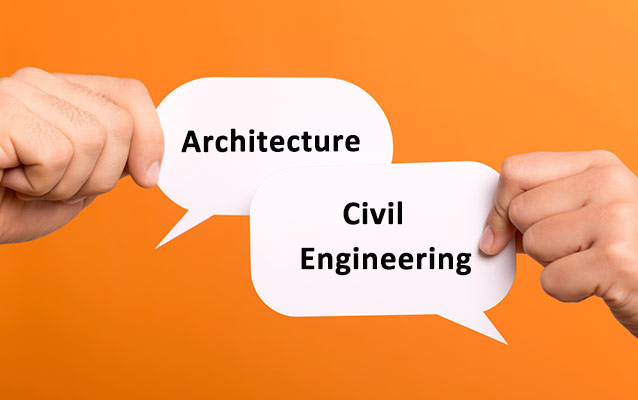

Difference Between Civil Engineering And Architecture
Naief Khatri

A person who has a great imagination, ability to visualize things and who is good at drawing is often confused between choosing civil engineering or an architecture programme. While both these fields seem apparently similar, there are actually lots of differences between the two.
Civil Engineering
At the undergraduate level, the degree programme in civil engineering is offered as a 4 year course. You can even pursue a diploma in civil engineering. The duration of these diploma courses is less than that of the degree course. Civil Engineering deals with the design, construction and maintenance and the mathematical aspects of naturally built and man-made structures, it is not concerned with the artistic aspects of designing a building.
Eligibility and Entrance Exams at the Graduate Level
Job Prospects and Higher Education
After doing B.Tech in civil engineering, you can look for jobs in government aided construction projects, building work, consultancy firms and even with private builders and constructors. You can pursue an M.Tech and specialize in fields like structural engineering, hydraulics and transportation engineering. For admission to post graduate courses, you need to appear for exams like GATE. Of course, there are institutes that conduct their own entrance exams as well.
Architecture
Architecture is the science of designing buildings and other physical structures. The duration of the undergraduate degree programme in architecture is 5 years. The course mainly deals with the artistic aspects of a building and focuses less on the mathematical aspects of a building.
Eligibility and Entrance Exams at the Graduate Level
To pursue a degree course in architecture, you need to have physics, chemistry and maths at the HSC (or equivalent) level with at least 50% marks. Examinations like NATA, AIEEE and other university level entrance exams are conducted each year for admission to this course. You can even purse a masters degree course in the field of architecture. You need to take the entrance exams for the same.
Job Prospects and Higher Education
To practice as an architect, you need to register yourself with the Council of Architecture. You can also apply to government jobs or even set up your own architecture firm.
Difference Between Civil Engineering and Architecture | |
Civil Engineering (BE/B.Tech) | Architecture (B.Arch) |
| The duration of the course is 4 years. | The duration of the course is 5 years. |
| Civil engineering mainly deals with the mathematical and scientific aspects of a building. | Architecture deals with the look and other artistic aspects of designing a building. |
| A civil engineer oversees the construction of roads, flyovers and underpasses, among other things. | An architect designs buildings, monuments, bridges, among other things. |
| Equipped with a B.Tech in civil engineering, you can apply for jobs, directly. | To practice as an architect, you need to register with the Council of Architecture. |
| Civil engineering deals more with the strength of the structure | Architecture deals more with the aesthetics of the structure. |
| Civil Engineering, deals with the material used for the building and how to design the building so it can support its own weight | Architecture deals with making the floor plans of a building and designing the shape of the building. |
Related Links
Latest News
People Reading Now

CBSE Compartment Result 2023 OUT: Click For Direct Link



CSAB 2023: Special Round Registration Begins Today


